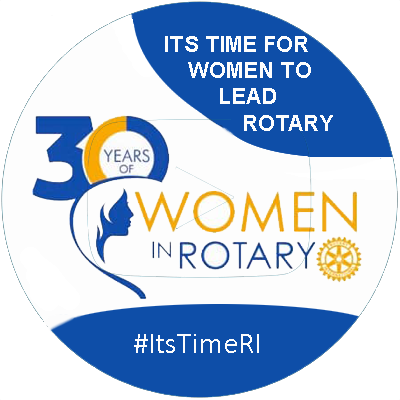The need to replace Sushil Gupta, RIPN 20-21, who resigned for health reason, presented the opportunity for the 20-21 Nominating Committee to correct a historical injustice.
Women have been official members of Rotary International for thirty years and another 10 in an unofficial capacity. Until this selection process emerged the chances of a woman, becoming President-Nominee was extremely remote.
As the nomination of Holger Knaack attests it remains remote.
The Rotary World, however, is not the same today as it was less than two weeks ago. During the past week, Women in Rotary stood up and said #ItsTimeRI. No one has to be told what “It” stands for!

From the Women in Rotary FaceBook Page
After thirty official years, it is still not possible to find ten men who will put a woman at the head of this great organisation. There is plenty of evidence that Women using social media for the first time to vent their desire and frustration with the process profoundly upset the members of the nominating committee.
For the first time, the chair of the Nomination Committee took to Social Media and posted a very detailed account of the process used in the selection of the President-Nominee. In the description, the chair revealed two facts that need resolution. The first is the general prohibition embedded in subsection 11.060 of Article 11 of the Rotary Manual of Procedure which I quote in full:
11.060. Campaigning, Canvassing, and Electioneering.
In order that the best qualified Rotarians shall be selected for service in RI’s elective
offices, any effort to influence the selection process for an elective office in a
positive or negative manner by campaigning, canvassing, electioneering or otherwise
is prohibited. Rotarians shall not campaign, canvass, or electioneer for elective
position in RI, or allow any such activity, either on their behalf or on behalf of
another. No brochures, literature, letters, or other materials, including electronic
media and communications, may be distributed or circulated by Rotarians or on
their behalf to any clubs or members of clubs except as may be expressly authorized
by the board. Where candidates become aware of any prohibited activities having
been undertaken on their behalf, they shall immediately express their disapproval
to those so engaged and shall instruct them to terminate such activity.
Some will claim as the chair wrote, “There began to be postings on Facebook that in my view could be interpreted as trying to influence the nominating process which was of concern as the current rules prohibit anyone trying to influence the nominating committee.”
Is the view of the chair correct? The first sentence appears to be a general ban on all forms of campaigning, canvassing and electioneering. Sentences two, three and four, however, present a different interpretation. Sentence two speaks to the behaviour of a candidate. Sentence three speaks to Rotarians acting on behalf of a candidate. Sentence four puts the onus on the candidate to engage with those working on their behalf.
The Facebook campaign did not advocate on behalf of any particular candidate. It advocated only on behalf of a class of candidate. The Article is silent on whether Rotarians can or cannot campaign for a class of candidates. No one mentioned any person’s name, country or other identifying characteristics. Candidates quite rightly could say to other candidates, that the Facebook proponents were not specifically advocating on behalf of them as a candidate.
The second questionable statement in the Nomination Committee chair’s statement is this:
“The policy provides that it is up to candidates to ask Rotarians to cease and desist from trying to influence the committee .
This must have occurred as there were then postings that said certain folks had been “muzzled”. If so, the candidate(s) took
the proper prescribed action.”
In this statement, the chair only assumes that a candidate spoke with the person or persons making the posts to elect a woman. In this case, I am not aware, however, that any candidate approached the leader of the Facebook campaign in a manner prescribed by 11.060. On Friday evening shortly after 6:00 pm CDT, I received a call from the #ItsTimeRI creator about how she had been “blocked” from several Facebook sites and did I know how to unblock them. I also learned of the ad hominem attacks she had faced from a certain foot doctor who managed two of the unofficial Rotary discussion groups at LinkedIn. I later verified the written attacks by visiting both groups. Further, I am aware the ban continues from several Facebook sites.
“Muzzled” was certainly the correct word. Blocking speech by stealth is unethical. Certainly, such behaviour breached both the standard of the Rotarians Code of Conduct and Sub-article 11.060 to say nothing of The Four-way Test.
Whether Rotary or Rotarians like or not the rules of the game, have just changed. The campaign unleashed through FaceBook is not likely to stop. We will be entering into a new nomination process this summer for the 21-22 President-nominee, I fully expect the campaign will continue to grow.
Ironically, I was at my District Conference and the plenary speaker I listened to about an hour before I took the call was Dr Sylvia Whitlock, the first woman to become a Club President and one of the first four women to become a Rotarian. She described how it took nearly eleven years, and a Supreme court decision plus a Council on Legislation resolution before Rotary would recognise her as a member.
Something tells me Article 11 subsection 11.060 could not withstand a First Amendment challenge in US courts. #ItsTimeRI to recognise that the jig is up. When I told our female District Governor that the chance of having a woman as president was mathematically higher than it had ever been, she told the assembly, and a cheer erupted. This time ten or more men did not hear that cheer. Let's hope this summer there are ten or more men who do.
